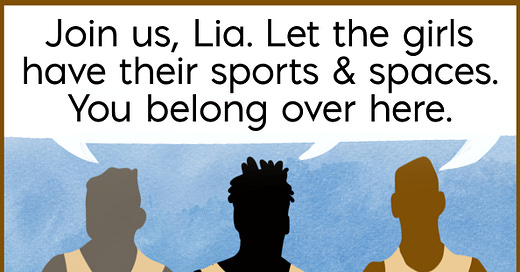Will Male Athletes Welcome "Girly" Boys into Their Sports?
Flipping the Script on Inclusion
Hi friends and welcome, new subscribers!
“Men's sport needs to be more accepting of gender diversity.” — Cori Cohn
Good news this week from the U.K. Supreme Court, which ruled that only women are women. Yes, obvious! But this is the first high court to recognize that women's legal rights are based on biological sex, not “gender identity.”1 The ruling will affect every arena in which sex matters, including prisons, schools, universities, medical care, restrooms – and sports and locker rooms.
More good news: Last month, World Athletics, which governs running and track, decided to implement mandatory sex screening (a cheek swab) for all female athletes. It’s a non-invasive, once-in-a-lifetime proof of femaleness that was effective in the Olympics from 1968-1992.
More good news: Over the past few years, the international federations of cycling, swimming, rowing, boxing, golf, rugby, powerlifting, and mixed martial arts have all revised their policies to restrict female sports to females (with a few caveats), as have the National Collegiate Athletic Association and twenty-seven U.S. states.
But Where Can Trans-Identified Males Play Sports?
Applauding the landmark Supreme Court ruling on the “Science of Sport” podcast this week, sportswriter Mike Finch pivoted to this question:
“But how can we not drive the transgender people away from sport? Because they do have a right to play.”
By “transgender people,” Finch is referring to men.
“Everyone should be welcomed into sport, but not at the expense of other people's fairness and safety and sporting integrity,” replies Dr. Ross Tucker, Finch’s “Science of Sport” co-host. Tucker is an eminent South African exercise physiologist who has conducted pioneering research on male-female sex differences in sport.
Tucker poses his own question: “If you think about men's and women's sports as separate entities, which sporting entity needs to be more accepting of… gender diversity and how people identify?”
Finch pauses, considering. “The men’s.”
“Yeah,” says Ross. “The kindness that women have been asked to extend should have been asked of men.”
“Can you see that ever happening?” asks Finch.
Hm. Will male athletes ever welcome onto their playing fields the men who wear dresses, who wear makeup, who have breasts, who call themselves “Cecilia”? Stranger things have happened. Those same men stripping naked in women’s locker rooms, for instance.

It’s Boys, Not Girls, Who Need to Be More Inclusive
Like Tucker, Cori Cohn insists that it’s boys, not girls, who need to be more inclusive. Cohn is a writer, podcaster, and activist who “tried to become a woman” for about thirty years, a process that included genital surgery at 19. Gradually, he came to terms with the fact that humans can’t change sexes, despite his doctors’ promises. Now he advocates – frequently, thoughtfully, eloquently – in favor of female-only sports and spaces and against medical interventions for kids who reject sex stereotypes.
Testifying recently before the Nevada Interscholastic Activities Association (NIAA), Cohn offered the group a way to protect the female sports category despite a major hurdle: The Nevada Constitution explicitly protects “gender identity.”
“Males should be given as much protection as possible – to play in their biological sex category,” Cohn testified, employing a fascinating flip of the typical script.
“The boys who are gender-diverse should not be abused or bullied or excluded from playing boys’ sports. Boys who identify as girls [need] those opportunities to play with members of their sex. Otherwise, their rights are being violated.”
This is a novel argument: That failure to include all males in male sports can constitute discrimination based on “gender identity.”
What If Boys Encouraged Other Boys to Respect Girls?
“Coaches and male high school athletes need to reach out to boys who are trying to play in women's sports and say, ‘I want you to try out on our team. However you identify, we are the same sex, and I want you to be with us, where we will respect you as an equal teammate – so that the girls can go have their sports in a fair and safe way.’”
This is a beautiful invitation. Note Cohn’s final phrase: “…so that the girls can go have their sports in a fair and safe way." He asks boys to teach what he calls “girly boys” to respect girls’ sports and spaces.
Shortly after the hearing, the NIAA changed its policy to limit girls’ sports to girls.
The Foundational Error
In an email, Cohn added, “The boys who are affected by policies that protect women’s and girls’ sports are particularly vulnerable as they’ve been lied to by adults that they’re entitled to usurp the rights of women and girls.”
Helen Joyce, author of Trans, calls this societal lie a foundational error. A foundational error is an incorrect assumption that undermines the integrity of an entire framework. Therapists, doctors, parents, and trans influencers implicitly promise boys that, once “transitioned,” society will accept them as girls or women. The error: No one polled the rest of us to ask if we’d be willing to play along.
Boys who are allowed to compete on girls’ teams “are the targets of invective which, in a fair world, would fall squarely on the heads of the adults enabling them,” says Cohn. “As non-intuitive as it seems, these boys are also victims, and merit a system of protection as well.”
Some readers may feel no sympathy for teenage boys who lack the courage and integrity to stay out of girls’ sports. But boys who have been indoctrinated to believe they deserve female rights — and that they’re “really” girls or can become girls — should be educated, not blamed.
I’m not calling for a passive “be nice”; I’m calling for a thoughtful response to a massive cultural crisis not of their making. At the high school level, these are just kids who are rejecting sex-role stereotypes, and following advice and rules created by grownups. They’re victims of that foundational error — that if they pretend to be female, society will play along — and turns out, we won’t.
Cohn concludes the podcast by speaking directly to male athletes, urging them to welcome the boys who prefer feminine names, attire, or hairstyles.
“Come on, lads,” he says.
Thoughts? I’m always curious.
See also:
and related stories in my #SaveWomensSports section.
Gender and gender identity are poorly defined terms based on sex-role stereotypes. See Jo Brew’s provocative and hilariously titled essay on gender abolition: “A Woman Needs a Gender like a Fish Needs a Frying Pan.”






Yes. The inclusion problem is the manly men rejecting those who aren’t what they consider “alpha males.” These boys and men deserve to be respected and treated with dignity by other boys and men. All while being allowed to dress and present however they want without being afraid of getting abused for their choice of style.
Terrific post, thank you so much. Cori Cohn is a thoughtful, subtle thinker. His approach here is brilliantly fair and humane. I have restacked.